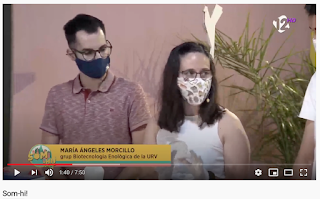Last Tuesday 21st July our group colleagues M. Ángeles Morcillo (postdoctoral researcher) and Aitor Balmaseda (PhD student) were interviewed in TV (TAC12, Tarragona) in a magazine show called "Som-hi" ("Come on" in Catalan). As we can see in this video, they showed in a very easy way how to extract DNA from strawberry and from yeasts.
portada web 20211017

Saccharomyces cerevisiae (left, image from Mogana Das Murtey) and Oenococcus oeni (right, image from Fabio Coloretti), the two microorganisms with which the group works the most
Thursday 30 July 2020
Thursday 23 July 2020
Welcome
Welcome to the website of the Wine Biotechnology research group of the Rovira and Virgili University. The group has been recognized by AGAUR (2017 SGR 26). The group laboratories and main resources are located in the Campus Sescelades, at Tarragona (Catalonia, Spain). The members of the group are affiliated to the Department of Biochemistry and Biotechnology and the Faculty of Enology. This website is intended to provide some useful information about our research activities and group members.
The research lines of the group are focused on the study of the main microorganisms involved in wine fermentation, yeasts and lactic acid bacteria. A common and transversal characteristic of both research lines is the use of molecular biology techniques for the identification and monitoring of the physiological changes of those microorganisms.
The research line focused on yeasts investigates topics as diverse as the yeast nitrogen nutrition, adaptation of yeasts to climate change conditions, production of bioactive compounds or interactions between yeasts of different species. The research line focused on lactic acid bacteria analyzes the interactions between bacteria and yeasts, the response of these bacteria to the stress produced by ethanol and also the ecology and biotechnological potential of lactic acid bacteria in other fermented foods, as table olives.
For many years, the group had another active line of research focused on acetic acid bacteria and its role on vinegar and other seasonings.
Dra. M. Jesús Torija, Coordinator of the group
Monday 20 July 2020
Effect of Several Nutrients and Environmental Conditions on Intracellular Melatonin Synthesis in S. cerevisiae
María Ángeles Morcillo-Parra, Gemma Beltran,Albert Mas,María-Jesús Torija
Grup de Biotecnologia Enològica, Departament de Bioquímica i Biotecnologia, Facultat d’Enologia, Universitat Rovira i Virgili
Melatonin is a bioactive compound that is present in fermented beverages and has been described to be synthesized by yeast during alcoholic fermentation. The aim of this study was to assess the capacity of intracellular and extracellular melatonin production by different Saccharomyces strains from diverse food origin and to study the effects of different fermentation parameters, such as sugar and nitrogen concentration, temperature or initial population, on melatonin production using a synthetic grape must medium.
Melatonin from fermentation samples was analyzed by liquid chromatography mass spectrometry. Intracellular melatonin synthesis profile did not present differences between yeast strains. However, extracellular melatonin production depended on the yeast origin.
Thus, we suggest that melatonin production and secretion during the different yeast growth phases follows a species-specific pattern. Other parameters that affected the fermentation process such as sugar content and low temperature had an impact on intracellular melatonin production profile, as well as the melatonin content within the cell. This study reports the effect of several conditions on the melatonin synthesis profile, highlighting its possible role as a signal molecule.
Subscribe to:
Posts (Atom)
Introductory Course to Research in Microbiology
8th-11th July 2024: Introductory Course to Research in Microbiology Professor J.R. Vilanueva, in Valencia, organised by the Spanish Socie...

-
L ast 13th November 2023, our PhD student Rafael Torres Guardado has presented in the Faculty of Oenology his thesis " Efecto del á...
-
Interested in wine yeasts ? Our Wine Biotech Group offers a predoctoral URV grant (4 years) for working in the subject " Melatonin ro...
-
Congratulations to Carmen ! On 24th May 2023 she defended very well her CV and her research project on microbiological techniques applied t...




